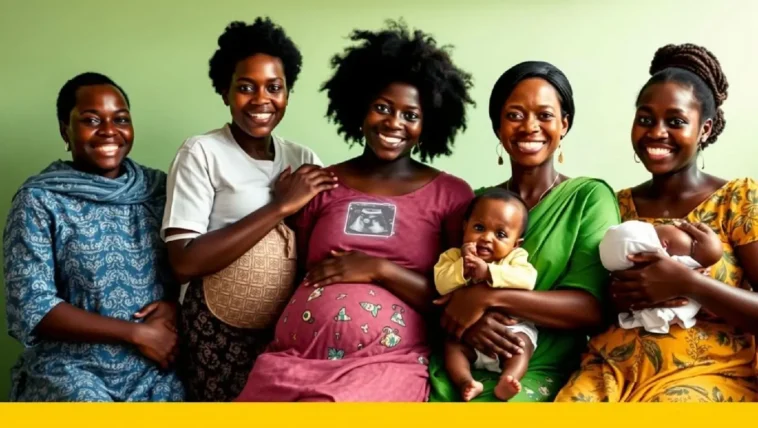Nigeria Maternal Mortality
Nigeria’s Fight: New Tech Tackles Maternal & Child Deaths
Nigeria Maternal Mortality is being tackled with innovative solutions, leveraging technology and community engagement for impactful results.Nigeria’s Bold Strides: Tackling Maternal & Child Mortality with Tech and Tradition
For too long, Nigeria has battled a silent crisis: unacceptably high rates of maternal and child mortality. Every year, countless women lose their lives during childbirth, and newborns fail to thrive, leaving families and communities devastated. The statistics paint a grim picture, but a new wave of innovation is bringing hope to the nation. Nigeria Maternal Mortality rates have been a persistent challenge, but the country is now fighting back with a blend of technology and time-honored traditions.
The numbers are stark. Nigeria accounts for a significant percentage of global maternal deaths, a statistic that demands urgent and decisive action. Preventable complications during pregnancy and childbirth continue to claim lives, highlighting the critical need for improved healthcare access and quality. But amidst these challenges, a beacon of hope emerges: the Maternal and Newborn Mortality Reduction Initiative, or MAMII.
Enter MAMII: A Data-Driven Revolution in Healthcare
Launched in 2024 under President Bola Ahmed Tinubu, MAMII represents a paradigm shift in Nigeria’s approach to maternal and child health. This data-driven program targets 172 local government areas where over half of Nigeria’s maternal deaths occur. By focusing resources on these high-burden areas, MAMII aims to maximize its impact and bend the curve on mortality rates.
MAMII isn’t just another top-down initiative. It’s a ground-up revolution, leveraging data to pinpoint the areas most in need and tailoring interventions to meet specific local challenges. The initiative’s success hinges on its ability to gather, analyze, and act on real-time data, ensuring that resources are deployed effectively and efficiently.
At the heart of MAMII lies a commitment to evidence-based decision-making. By continuously monitoring and evaluating its progress, the initiative can adapt its strategies and refine its approach, ensuring that it remains responsive to the evolving needs of Nigerian communities.
AI Ultrasound & Digital Doctors: Tech’s Frontline Role in Saving Lives
Imagine a world where pregnant women in remote villages can access high-quality prenatal care with the touch of a button. That’s the vision driving Nigeria’s embrace of digital health technologies. AI-powered mobile ultrasound is at the forefront of this revolution, bringing diagnostic capabilities to even the most underserved communities.
These portable devices, coupled with digital platforms for data tracking, are empowering healthcare workers to identify high-risk pregnancies and provide timely interventions. The integration of technology is not just about convenience; it’s about saving lives by detecting potential complications early and ensuring that women receive the care they need, when they need it most.
Nigeria is also exploring the use of telemedicine and other digital tools to connect pregnant women with specialists and provide ongoing support. This virtual network of care is breaking down geographical barriers and ensuring that every woman, regardless of her location, has access to expert medical advice.
Bridging the Gap: Community Engagement and Cultural Sensitivity
Technology alone cannot solve Nigeria’s maternal health crisis. To truly make a difference, it’s essential to address the sociocultural factors that influence healthcare-seeking behaviors. That’s why MAMII places a strong emphasis on community engagement and cultural sensitivity.
Traditional birth attendants, trusted figures in many Nigerian communities, are being enlisted as partners in this effort. By providing them with training and resources, MAMII is empowering them to promote safe birth practices and encourage women to seek facility-based care.
Community and religious leaders are also playing a vital role in fostering trust and dispelling misinformation. By working with these influential figures, MAMII is overcoming sociocultural barriers and promoting positive health-seeking behaviors.
Incentivizing Safe Births: The Impact of Essential Kits
To further encourage facility-based deliveries, MAMII is providing essential kits for mothers and newborns. These kits contain items such as diapers, baby clothes, and sanitary pads, providing a much-needed boost to families and incentivizing them to choose a safer birthing environment.
The provision of these kits is not just about material support; it’s about signaling to women that their health and well-being are valued. By removing financial barriers and providing essential resources, MAMII is making it easier for women to access the care they need.
The kits also serve as a tangible reminder of the importance of seeking skilled birth attendance. By associating these items with facility-based deliveries, MAMII is reinforcing the message that hospitals and clinics are the safest places to give birth.
Emergency Transport: Overcoming the Last Mile
One of the biggest challenges in reducing maternal mortality is ensuring timely access to emergency obstetric care. In many parts of Nigeria, poor infrastructure and limited transportation options make it difficult for women to reach hospitals and clinics when complications arise. MAMII is addressing this challenge by deploying emergency transport solutions.
These solutions include ambulances, motorcycles, and even boats, depending on the local context. By providing reliable transportation, MAMII is ensuring that women can reach the care they need, when they need it most. This rapid response system is crucial for saving lives and preventing long-term complications.
The emergency transport solutions are also equipped with communication devices, allowing healthcare workers to coordinate care and ensure that hospitals are prepared to receive patients. This streamlined system is improving the efficiency of emergency response and maximizing the chances of a positive outcome.
Beyond the Pilot: Institutionalizing Success for Long-Term Impact
MAMII isn’t just a short-term project; it’s a long-term investment in Nigeria’s health system. The government is committed to institutionalizing successful interventions and scaling them up nationwide. This means integrating proven strategies into the national health system and ensuring that they are sustainable over time.
This commitment to sustainability is evident in the emphasis on training and capacity building. By equipping healthcare workers with the skills and knowledge they need, MAMII is ensuring that the benefits of the initiative will continue to be felt long after the program ends.
The government is also working to strengthen the health system as a whole, improving infrastructure, increasing funding, and promoting good governance. These efforts are essential for creating a supportive environment in which MAMII can thrive.
The Roadblocks Ahead: Challenges and Persistent Barriers
Despite its successes, MAMII still faces significant challenges. Inadequate infrastructure, limited digital connectivity, and sociocultural barriers remain persistent obstacles. Addressing these challenges will require sustained effort and a multi-faceted approach.
Improving infrastructure is essential for ensuring that healthcare facilities have the resources they need to provide quality care. This includes upgrading equipment, improving sanitation, and ensuring a reliable supply of electricity and water.
Expanding digital connectivity is also crucial for scaling up digital health solutions. This requires investing in broadband infrastructure and promoting digital literacy in rural communities.
Global Solidarity: Nigeria’s Call for International Cooperation
Nigeria recognizes that it cannot tackle the maternal health crisis alone. International cooperation is essential for providing financial and technical support. At the World Health Assembly in Geneva, Nigeria’s Minister of State for Health and Social Welfare, Dr. Iziaq Adekunle Salako, called for global solidarity and urged partners to join in “bending the curve for every mother, every newborn, and every child.
This call for collaboration is a recognition that maternal health is a global issue that requires a global response. By working together, countries can share best practices, pool resources, and accelerate progress towards achieving the Sustainable Development Goals.
Nigeria is also committed to sharing its own experiences and lessons learned with other countries. By serving as a model for innovation and collaboration, Nigeria is helping to inspire action and drive progress on maternal health worldwide.
A Model for Africa? Lessons from Nigeria’s Healthcare Revolution
Nigeria’s approach to tackling maternal mortality is not just a national success story; it’s a potential model for other low- and middle-income countries facing similar challenges. By emphasizing scalability, sustainability, and adaptability, Nigeria is demonstrating that it’s possible to make significant progress even in resource-constrained settings.
The lessons learned from MAMII can be applied to other areas of healthcare as well. By embracing data-driven decision-making, community engagement, and technological innovation, countries can transform their health systems and improve the lives of their citizens.
As Nigeria continues to refine and expand its efforts, it is poised to become a leader in global health, inspiring hope and driving progress towards a healthier future for all. The Nigeria maternal mortality rate can be improved, and Nigeria is showing the world how it can be done.
As Nigeria pushes forward with these vital initiatives, the need for accessible and reliable diagnostic tools becomes ever more critical. Early detection of potential complications is paramount in ensuring safe pregnancies and deliveries. The integration of advanced technology like AI-powered ultrasound is a game-changer, but access to quality equipment remains a significant hurdle for many healthcare facilities.
For those seeking to support these efforts or enhance their own medical capabilities, exploring the range of available ultrasound solutions can be a powerful step. From portable devices ideal for community outreach to sophisticated systems for comprehensive diagnostics, there’s a technology to meet every need. Ready to take a closer look at the tools that are helping to save lives? Discover a curated selection of ultrasound machines and related equipment that can make a real difference. Your contribution could help bring safer births and healthier futures to countless families across Nigeria. Share your thoughts and experiences in the comments below, and don’t forget to subscribe to the Naija NewsBurrow newsletter for the latest updates on health innovations and community initiatives.
Shop Products On Amazon
Shop Products on Ebay
Trending Similar Stories in the News
‘Difficult choices’: aid cuts threaten effort to reduce maternal deaths in Nigeria The Guardian...
Trending Videos of Nigeria Maternal Mortality
Nigeria: Maternal Health Perspectives From The Frontlines
Similar Popular Articles
#MaternalHealth #ChildHealth #Nigeria #GlobalHealth #HealthInnovation
Nigeria, Maternal Mortality, Child Mortality, Health, Innovation

